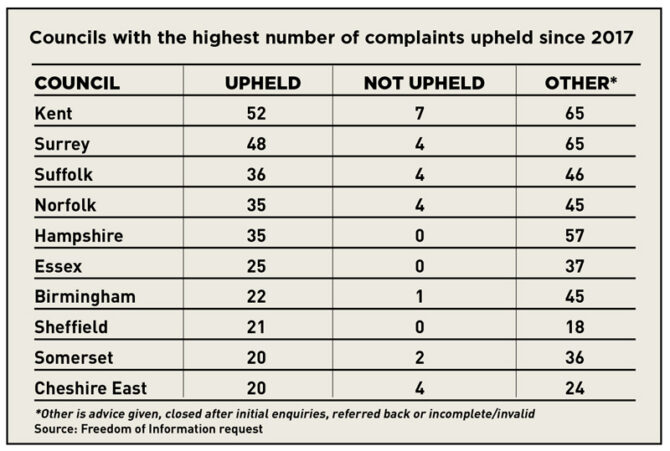Complaints by parents desperate to get help for their vulnerable children look set to double compared with five years ago, new figures further exposing the broken SEND system show.
The Local Government and Social Care Ombudsman (LGSCO) received 403 complaints about how councils dealt with special educational needs (SEN) services between January and May, nearly the same as the 424 submitted in the whole of 2017.
The data, obtained by a freedom of information request, shows on average nearly 90 per cent of investigated complaints have been upheld. Most are likely to relate to education, health and care plans (EHCPs), a legal document detailing what support a child should get.
Sharon Chappell, the assistant ombudsman, said investigation teams were “at capacity. We are seeing wide-ranging systemic issues, councils struggling to cope and meet the statutory timescales.
“In cases where they are met, we then see issues in terms of provision and lots of problems with relationships between health and social care and education not being fully joined up.”
The LGSCO is a free, impartial service for parents who want to complain about a council’s administrative actions.
The body can set recommendations and request a council pays a parent compensation – sometimes totalling thousands of pounds.
While about two thirds of complaints are not investigated – they may not meet criteria, for instance – the sharp spike in objections shows the widespread discontent in a broken SEND system.
‘Money is nothing compared to what we’ve lost’
Emma Eveleigh, a mother of two children diagnosed with autism, has had four complaints upheld, with more than £9,000 awarded to her from Suffolk County Council in the past two years.
One ruling found the council took five months to begin trying to source therapy for her son during 2020. Another ruled the council failed to provide him with suitable full-time education for ten months.

She said the compensation was “to make up for lost education and provision, but you can never make up for lost time in school or provision”.
“It’s nothing compared to what it would have cost the local authority to actually provide the education or provision so there is no motivation for the local authority to improve.”
And while complaints to the ombudsman can take months to process, Eveleigh said: “You know that you were right to take it that far and fight as you did. Otherwise you’re made out to be a terrible parent and people think that you’re awkward or demanding.”
Thirty-six complaints against Suffolk have been upheld since 2017, 90 per cent of those investigated.
The county follows Surrey which had 48 upheld and Kent which topped the table with 52.
It comes among a backdrop of nine in ten parents winning SEND tribunals last year. This is a separate appeal route where parents can challenge council refusals to assess a child’s needs or issue an EHCP.
Lack of transparency during Covid decisions
The FOI figures show a slight dip in complaints in 2020 as the ombudsman closed for three months during the first lockdown.
During this time, the government temporarily allowed councils to suspend their normal duty to secure EHCP provision, replacing this with a need to make “reasonable endeavours”.
When it reopened, Chappell said it found a “lack of transparency and audit trails” on how some councils made decisions during the pandemic.
For example, a parent in Surrey was awarded £300 after complaining the council failed to ensure their son received support listed in his EHCP during the first wave.
Now, year-on-year, the ombudsman is receiving unprecedented numbers of complaints on SEN.
Chappell said inspectors are “running at full capacity” after a near 40 per cent government budget cut several years ago.
“And the way we then have to manage is to make difficult decisions around injustice and what cases we will and won’t consider.”
She added that about half of cases it investigated were children’s services, SEN and adult social care as “potential injustice is greatest” in those situations.
In Hertfordshire, Donna Sharp has had two complaints upheld, one on school transport and the other on alternative provision.
She said LGSCO was the “only thing I had” to get accountability for her child. But she said it needed more powers, such as being able to investigate schools as well as enforcement.
Many parents are also frustrated that the ombudsman cannot investigate cases that are ongoing through the tribunal courts.
LGSCO’s jurisdiction is set by the government, but its triennial review called for this to be extended to consider the actions of a school fulfilling an EHCP. The government is yet to respond.
The Local Government Association said councils did “everything they could” to achieve the best possible support and education, but it is within “the budgets made available by the government”.















My 9 year old grandson has not been to school since last spring, and my daughter is getting no help from anybody. He cries because he does not go to school, and is becoming very isolated not mixing with other children, he doesn’t talk very much, but is aware that he is different from other children, he has no friends and is very lonely. I fear for his mental health and wellbeing, surely this is not acceptable in this day and age, his parents would end up in court if they didn’t send him to school. Can anybody help